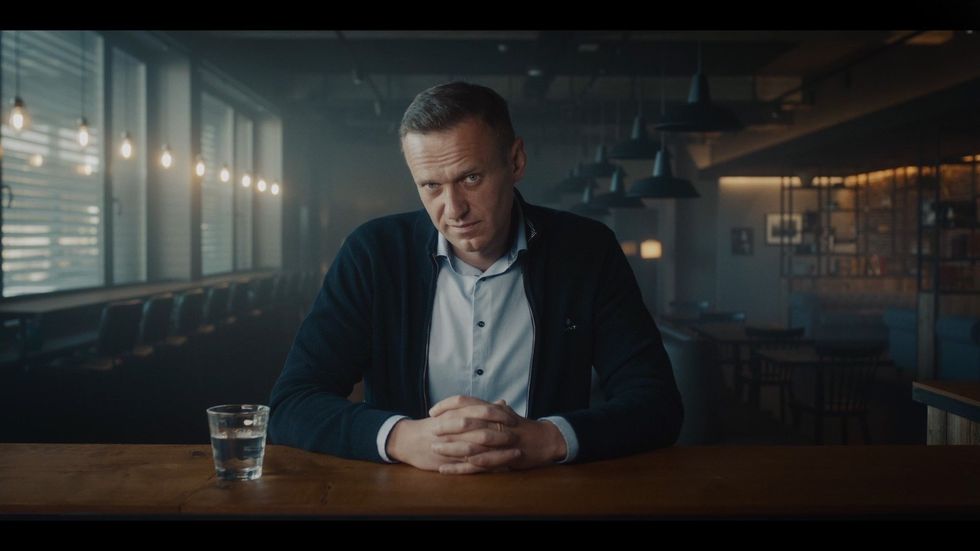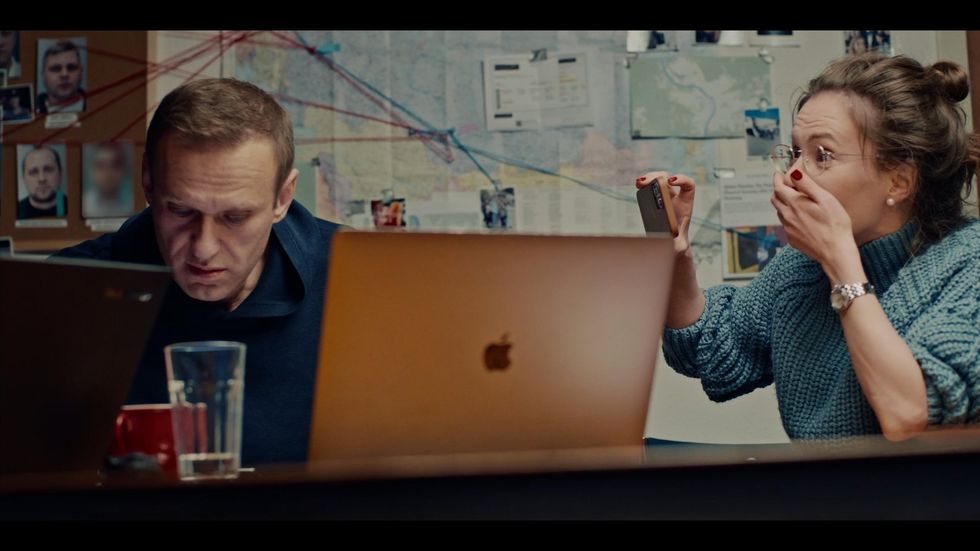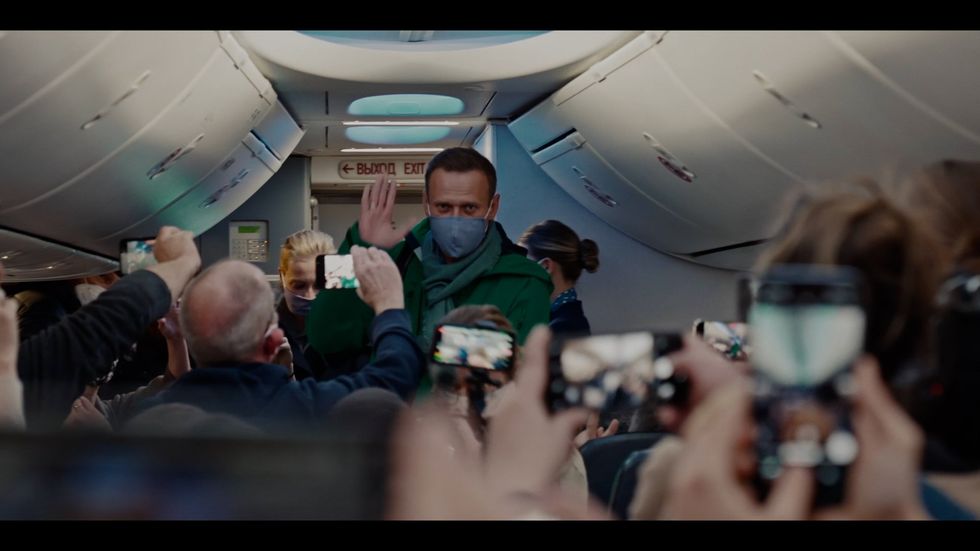“A film is a weapon on time delay” — an interview with “Navalny” director Daniel Roher
February 16, 2024
Our journalists bring you on-location video reports digging into news stories around the world.
Presented by
BREAKING: Jailed Russian opposition leader Alexei Navalny has died, according to the prison service.
Vladimir Putin may be busy waging war on Ukraine and threatening NATO with nuclear strikes, but back home in Russia what scares him most is a man languishing in a tiny jail cell five hours east of Moscow.
Opposition leader Alexei Navalny is Russia’s most prominent dissident. In August 2020, someone tried to poison him to death. He was flown abroad to Germany for treatment and then, unfathomably, returned to Russia, where he was promptly arrested and sentenced to a lengthy prison term.
The Oscar-nominated documentary “Navalny” follows him and his team during those crucial months in Germany, as they uncover details of the assassination plot, pulling strings that reach into the highest levels of the Kremlin. It plays, remarkably, as a thriller, a black comedy, and an intimate family portrait.
I recently sat down with “Navalny” director Daniel Roher to learn how the documentary got made, the geopolitical power of cinema, and what he hopes Putin will do if he ever sees the film.
Our conversation has been edited for length and clarity.
Alex Kliment: Let's start with the ending. You’re about to go to Los Angeles for the Oscars, but where is Alexei Navalny right now?
Daniel Roher: Right now, he’s in solitary confinement. They have him in torturous conditions. It's clear they are trying to destroy his body, his spirit, his mind, and his emotional and physical health. So, Navalny is not doing well, and it's really our principal responsibility to use the film as a vehicle to keep him in the world’s eye.
Tell me a bit about how the film came to be – how does a talented young filmmaker from Canada end up making a documentary about the most prominent dissident in the world?
Making documentaries is the art of being in the right place at the right time, and I think this film really embodies that. I was working on a film project in Ukraine, and I was with [investigative journalist] Christo Grozev. That film wasn't going well, and it was around that time that Christo started working on the Navalny case, digging around for who tried to poison him.
He started uncovering information pretty quickly, and after a few days, he was ready to approach Navalny [in Germany] and say, "I have some information I'd like to share with you. What do you think about doing a film project?"

Alexei Navalny, in the film “Navalny.” Courtesy: CNN Films
So how did you pitch a guy like Navalny? I mean, he’s already got millions of followers on YouTube, why does he need a film to be made about him?
Well, he'd already announced that he was going back to Russia. So what I told him was "look, you will likely be arrested, and in a year's time, you need a vehicle that will keep your name in the global consciousness.”
A YouTube video is made and released and it exists and is gone and forgotten in two or three weeks. But a film can be a weapon that's on a time delay. People will watch this film and think about Navalny and his family not for the next day or week, but for the rest of their lives.
He understood the value of that, and we started shooting the next day.
As a filmmaker, were you ever worried that maybe you were getting spun or used by Navalny's team?
It wasn't that I was worried about it. I was aware of it every single moment. Here I am making a film about a politician whose great gift is his mastery of the media. And it's actually an element that's woven into the fabric of the film. Who's directing whom?
Right, in the opening scene, Navalny tells you what kind of film he wants you to make!
Right. At the beginning of the film I ask him, "if you're killed, what message do you have for the Russian people?" And he dismisses the question in a very sarcastic Navalny way, and he says, "Daniel, we're not gonna make that boring memorial movie. We're gonna make a thriller. This has gotta be a thriller!"
But then at the end of the film I come back to that question and I say, "Alexei, seriously, answer the question: If you are killed, what message do you have for the Russian people?" And this time he answers the question very thoughtfully. He says, "Evil is only able to proliferate if good people do nothing, so don't be inactive."
For me, this was playing with the tension of who's directing whom. And it was my way of signifying, no, I’m at the helm here, because we made very clear from the very beginning that Navalny’s team would have no editorial control over the film.
For the viewer, the film plays like a real cloak-and-dagger thriller. You’ve said elsewhere that the experience of watching the film is a lot like the experience of making it. What did you mean by that?
Well, often people describe to me what it's like to see the phone call sequence, for example, for the first time …
The scene where Navalny tricks one of the assassins into essentially admitting that they tried to kill him ...
Precisely. And to be in the room for that moment was just jaw-dropping. Even though I don't speak a word of Russian, I was on one of the cameras, and I understood immediately that what we were filming was the most important thing I would ever film. You could read the expressions and emotions on people's faces and just intuit that this was crazy.
And Navalny immediately was like, "We have to put this on YouTube." And I understood right then, from a directorial perspective, that the weaponization of what we just shot would now be a plot point in the film.

Navalny and his team react as he tricks one of the assassins into revealing the plot. Courtesy: CNN Films
Let me ask you about how Navalny is viewed abroad. The West has a tendency sometimes to deify dissident figures in authoritarian regimes, and often we find out later that they're imperfect heroes. How well do you think we know Alexei Navalny and what he really thinks?
I think Navalny is a very decent guy, but at the same time, he wants to be president of the biggest country in the world – he wants power, and I'm not going to put him on a pedestal, he's certainly an imperfect human.
It's very well documented – and we see it in the film – that in the late aughts and in early 2010s Navalny went to the Russian March, a rally for Russian nationalists and other unsavory characters, Nazi sympathizers, and people like this. And I asked him about this and he said, basically, "I'm trying to build a broad-based coalition. I'm trying to take the liberals in Moscow and whoever else opposes the regime. If these nationalist guys oppose Putin, then we're on the same team right now. When it comes to figuring out the public policy of how to govern a free Russia, that's a different discussion. And I would never associate with these guys."
It's basically “the enemy of my enemy is my friend.” That's the political calculus he's making. And I can simultaneously understand it and be deeply uncomfortable with it.
If Vladimir Putin watches this film, what would you want him to take away from it?
You know, it's challenging to imagine him ... Putin just strikes me as a very weird, psychopathic kind of brain, who exists in an alternate reality …
Ok well let’s paint a picture … it's evening in the Kremlin, and after a long day of waging a catastrophic war in Ukraine, Putin shuffles into his lair, pours himself a glass of iguana juice or whatever it is he drinks at night, and sits down to watch your film. What do you want him to take away from it?
Well, I would hope that Putin would relent a little bit and give Navalny a break and give him medical attention and let his family visit him. But that wouldn't be at the top of my wishlist.
The top of my wishlist would be for him to end his brutal genocidal campaign and to take a dose of his own Novichok. Do the world a favor, because the world would be a much better place when Vladimir Putin is relegated to the dustbin of history.

Navalny boards a plane back to Russia in January 2021. He was jailed as soon as he landed, and hasn’t been free since. Courtesy: CNN Films.
Daniel, your film tells an incredible story about Alexei Navalny. How do you think that story ends?
Navalny has a life sentence, it's just a question of whose life it is, his or Putin’s. For millions and millions of Russians, Navalny is a very important figure. But for probably even more Russians, they view him as a bad person, as a criminal, as all of these things that the propaganda shows talk about.
I hope he survives. I hope he's reunited with his family. And one of my personal dreams is to be able to travel to Moscow one day and show him the film, which he has not been able to see.
Congratulations to @DanielRoher and the team behind Best Documentary Feature Film 2023 winner, "Navalny"!
Keep up with what’s going on around the world - and why it matters.